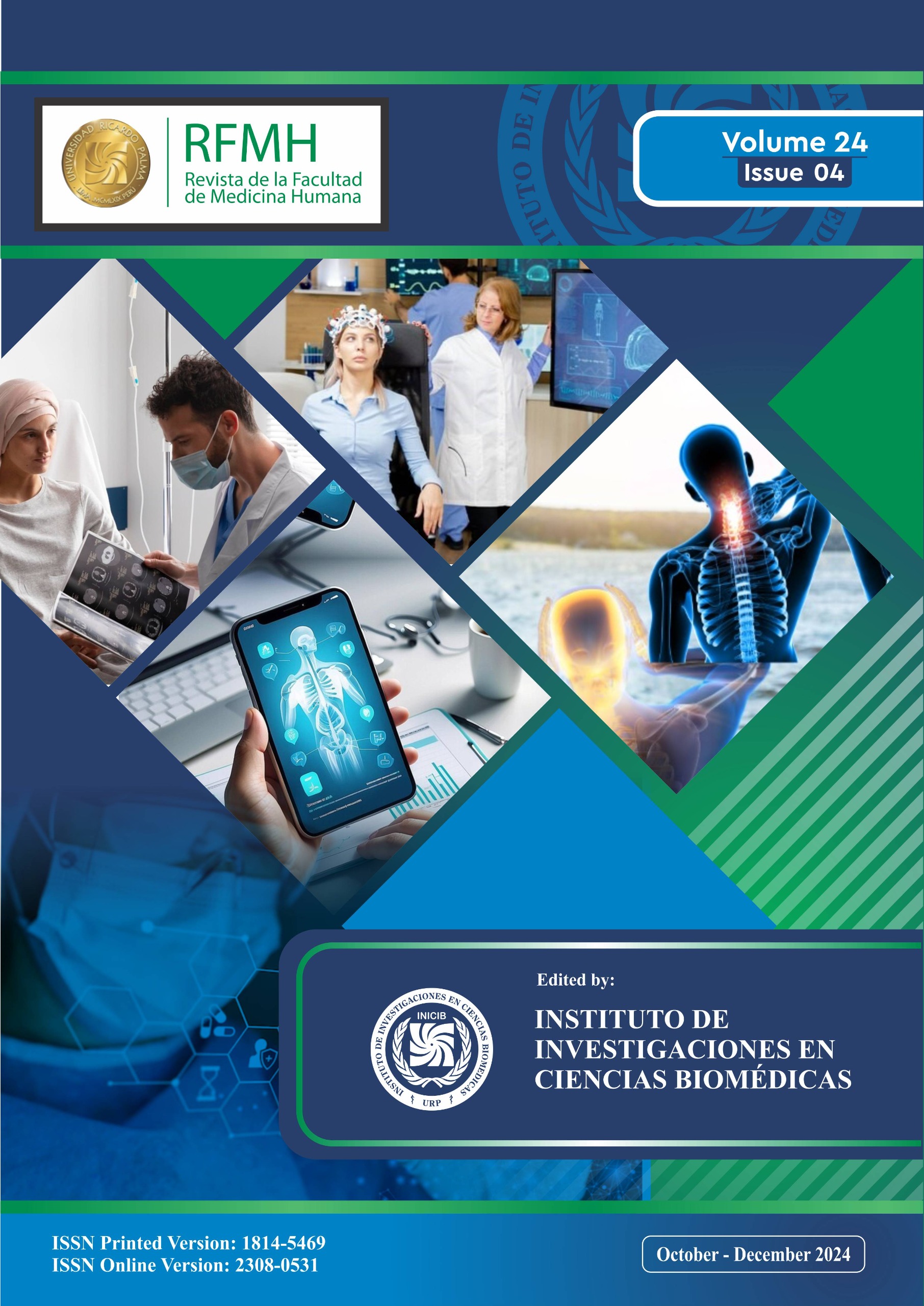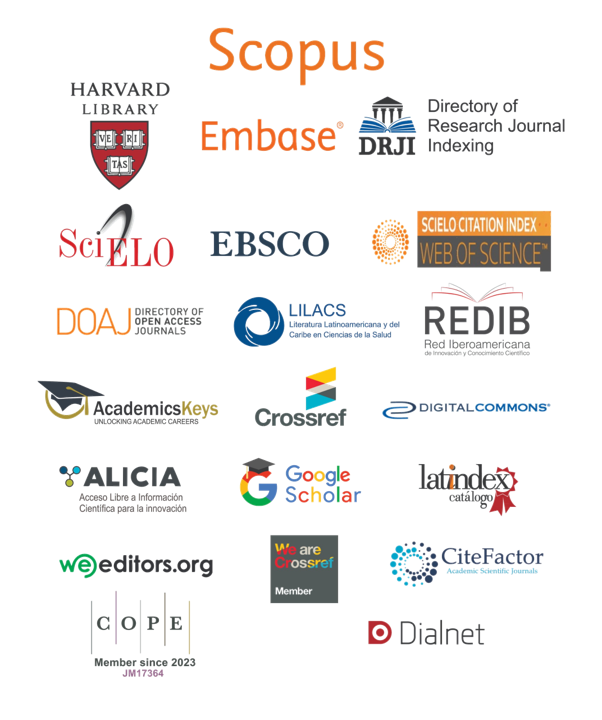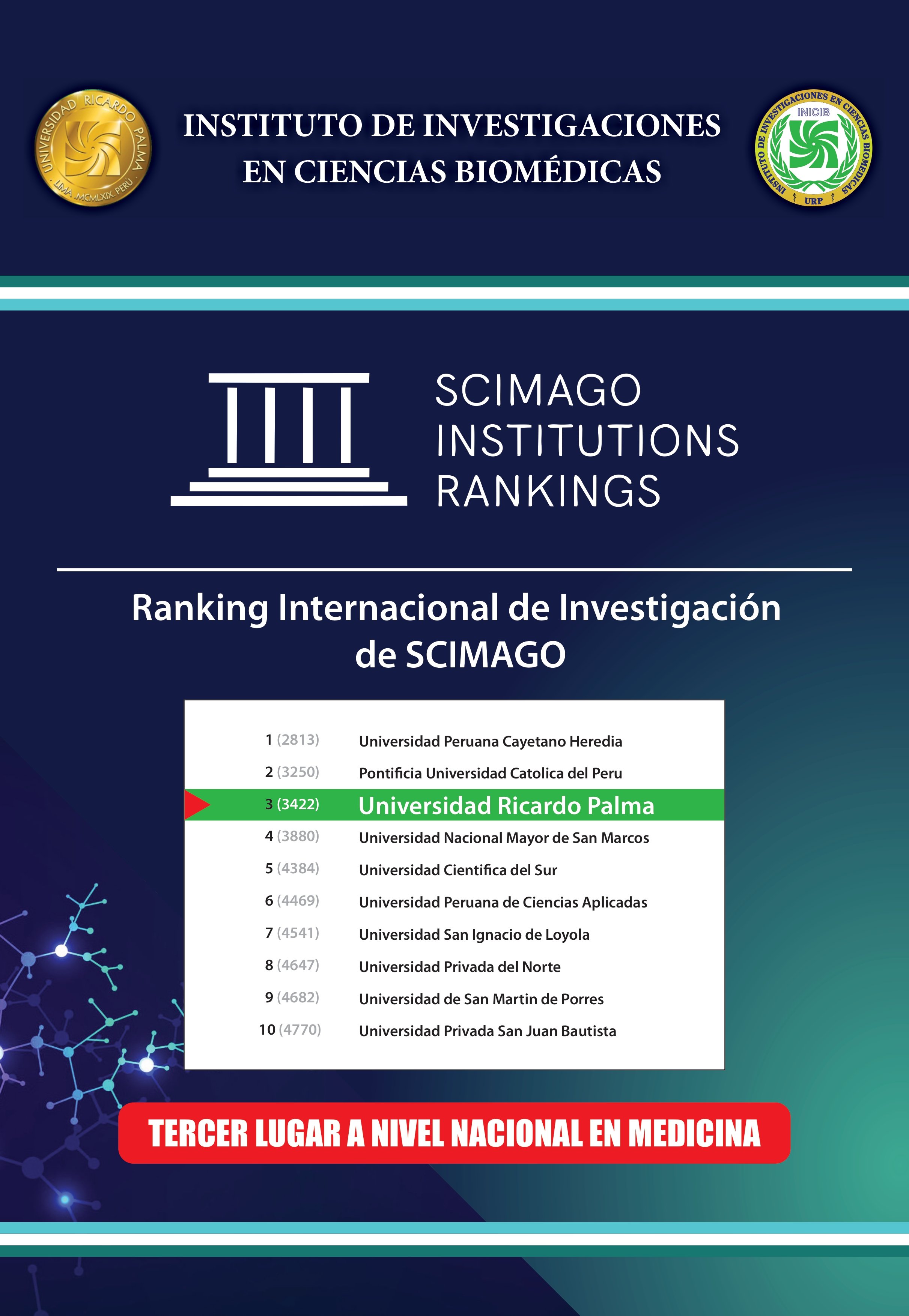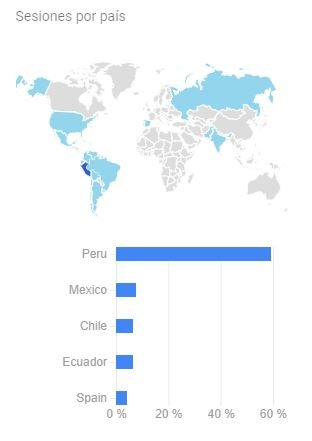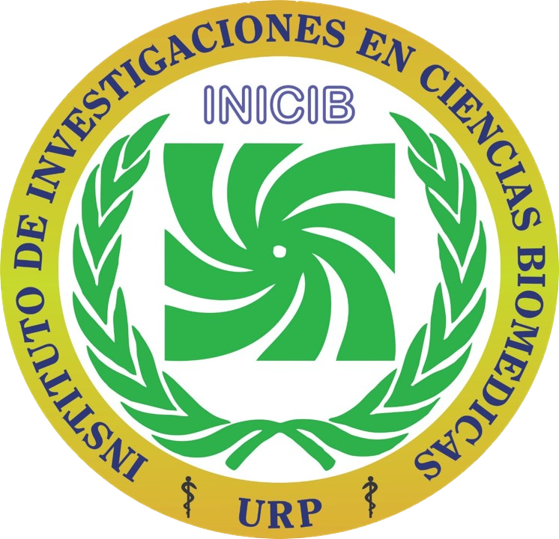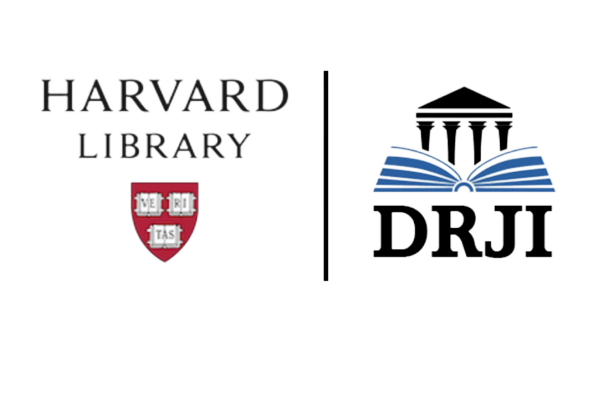IMPACT OF ADDICTION TO SOCIAL NETWORKS ON THE MENTAL HEALTH OF HUMAN MEDICINE STUDENTS, IN TIMES OF COVID-19
IMPACTO DE LA ADICCIÓN A REDES SOCIALES EN LA SALUD MENTAL DE LOS ESTUDIANTES DE MEDICINA HUMANA, EN TIEMPOS DE COVID-19
Keywords:
social networking, mental health, students, medical, Behavior, addictiveAbstract
Objective. To determine the association of addiction to social networks and the consequences in mental health in human medicine students of the Ricardo Palma University, year 2021. Materials and methods. Cross-sectional observational study, with the participation of 454 human medicine students from first to fifth year, chosen by stratified random sampling proportional to size. The instrument was validated, obtaining a Cronbach's Alpha (α=0.90), the questionnaires used were: Addiction to Social Networks (ARS), Depression, Anxiety, Stress Scale (DASS-21) and Pittsburgh Sleep Quality Index (PSQI). In order to evaluate the association between variables, we used crude and adjusted prevalence ratio (PR), using the Poisson regression model with the logarithmic link and with the 95% confidence interval. Results. 65.4% were women, with an average age of 21.2 years. A significant association was found between high social network addiction and mental health (PRc: 2.59; 95% CI: 1.92-3.50; p< 0.01) and, likewise, between high and medium levels of social network addiction. social and with depression, anxiety, stress (p< 0.01) and sleep quality (p<0.010), respectively. 41%, 49.1% and 9.9% of the students presented low, medium and high addiction to social networks, respectively. 57.5% had depression, 56.4% anxiety, 70.5% stress and 77.3% poor sleep quality. Conclusions. There was a strong association between ARS and mental health. Therefore, it is recommended that university students visit mental health specialists quarterly for proper identification, evaluation, and management of the problems generated by ARS.
Keywords: Behavior, addictive; social networking; mental health; students, medical (Source: MeSH NLM)
Downloads
References
Vega MÁP, Delgado AO, Meirinhos AR. Revisión sistemática del panorama de la investigación sobre redes sociales: Taxonomía sobre experiencias de uso. Revista Científica de Educomunicación. 2019;(60):81-91. doi: https://doi.org/10.3916/C60-2019-08
¿Qué son las Redes Sociales? [Internet]. RD Station. [citado 27 de agosto de 2022]. Disponible en: https://www.rdstation.com/es/redes-sociales/
Karim F, Oyewande AA, Abdalla LF, Chaudhry RE, Khan S. Social Media Use and Its Connection to Mental Health: A Systematic Review. Cureus. 15 de junio de 2020;12(6):e8627. doi:10.7759/cureus.8627
IPSOS Perú. Redes sociales 2021 [Internet]. Ipsos. 2021 [citado 4 de febrero de 2022]. Disponible en: https://www.ipsos.com/es-pe/redes-sociales-2021
Uso de Redes Sociales entre peruanos conectados 2020 [Internet]. Ipsos. [citado 8 de febrero de 2022]. Disponible en: https://www.ipsos.com/es-pe/uso-de-redes-sociales-entre-peruanos-conectados-2020
El internet de cada día: hábitos y actitudes hacia el internet 2021 [Internet]. Ipsos. [citado 27 de agosto de 2022]. Disponible en: https://www.ipsos.com/es-pe/el-internet-de-cada-dia-habitos-y-actitudes-hacia-el-internet-2021
Fernandes B, Biswas UN, Tan-Mansukhani R, Vallejo A, Essau CA. The impact of COVID-19 lockdown on internet use and escapism in adolescents. RPCNA. 2020;7(3):59-65. DOI: 10.21134/rpcna.2020.mon.2056
Balhara YPS, Mahapatra A, Sharma P, Bhargava R. Problematic internet use among students in South-East Asia: Current state of evidence. Indian J Public Health. septiembre de 2018;62(3):197-210. DOI:10.4103/ijph.IJPH_288_17
Younes F, Halawi G, Jabbour H, El Osta N, Karam L, Hajj A, et al. Internet Addiction and Relationships with Insomnia, Anxiety, Depression, Stress and Self-Esteem in University Students: A Cross-Sectional Designed Study. PLoS One. 2016;11(9):e0161126. DOI: 10.1371/journal.pone.0161126
Hou Y, Xiong D, Jiang T, Song L, Wang Q. Social media addiction: Its impact, mediation, and intervention. Cyberpsychology: Journal of Psychosocial Research on Cyberspace [Internet]. 21 de febrero de 2019 [citado 27 de agosto de 2022];13(1). DOI: http://dx.doi.org/10.5817/CP2019-1-4
Padilla C, Ortega J. Adicción a las redes sociales y sintomatología depresiva en universitarios. CASUS. 2017;2(1):47-53. DOI:10.35626/casus.1.2017.31
Vázquez-Chacón M, Cabrejos-Llontop S, Yrigoin-Pérez Y, Robles-Alfaro R, Toro-Huamanchumo CJ, Vázquez M, et al. Adicción a internet y calidad de sueño en estudiantes de medicina de una Universidad peruana, 2016. Rev haban cienc méd. 2019;18(5):817-30. Disponible en: http://www.revhabanera.sld.cu/index.php/rhab/article/view/2764
Jaiswal A, Manchanda S, Gautam V, Goel AD, Aneja J, Raghav PR. Burden of internet addiction, social anxiety and social phobia among University students, India. J Family Med Prim Care. 2020;9(7):3607-12. doi: 10.4103/jfmpc.jfmpc_360_20
Alcántara KEG, Tortolero RC, Silva C. Valoración psicométrica del Cuestionario de Adicción a Redes Sociales (ARS) en adolescentes mexicanos. Revista de Psicología Clínica con Niños y Adolescentes. 2021;8(3):26-34. doi: 10.21134/rpcna.2021.08.3.3
Contreras-Mendoza I, Olivas-Ugarte L, Cruz-Valdiviano C. Escalas abreviadas de Depresión, Ansiedad y Estrés (DASS-21): validez, fiabilidad y equidad en adolescentes peruanos. RPCNA. 2021;8(1):24-30. doi: 10.21134/rpcna.2021.08.1.3
Soto Rodríguez I, Zuñiga Blanco A. Depresión, ansiedad y estrés de universitarios en tiempos de COVID-19: Uso de escala DASS-21. Espíritu Emprendedor TES. 15 de julio de 2021;5(3):45-61. DOI: 10.33970/eetes.v5.n3.2021.263
Famodu OA, Barr ML, Holásková I, Zhou W, Morrell JS, Colby SE, et al. Shortening of the Pittsburgh Sleep Quality Index Survey Using Factor Analysis. Sleep Disorders. 2018;2018:1-9. doi: https://doi.org/10.1155/2018/9643937
Piscoya-Arbañil JA. Principios éticos en la investigación biomédica. Rev Soc Peru Med Interna. 2018;31(4):159-64. doi: 10.36393/spmi.v31i4.10
Haddad JM, Macenski C, Mosier-Mills A, Hibara A, Kester K, Schneider M, et al. The Impact of Social Media on College Mental Health During the COVID-19 Pandemic: a Multinational Review of the Existing Literature. Curr Psychiatry Rep [Internet]. 6 de octubre de 2021 [citado 16 de enero de 2022];23(70). doi: 10.1007/s11920-021-01288-y
Fitriasari A, Septianingrum Y, Budury S, Khamida K. Online Learning Stress Relates to Student Coping Strategies During the Covid-19 Pandemic. Jurnal Keperawatan. 2020;12(4):985-92. doi: https://doi.org/10.32583/keperawatan.v12i4.1047
Solis Baltazara J, Quispe Mamani A. Apoyo social percibido y riesgo de adicción a las redes sociales en estudiantes de una institución pública de Haquira. Revista Científica de Ciencias de la Salud. 2021;14(2):34-48. doi: 10.17162/rccs.v14i2.1654
Baños-Chaparro J. Uso de redes sociales y sintomatología depresiva en estudiantes universitarios. Eureka. 2019;17(2):101-16. Disponible en: https://www.researchgate.net/publication/342752525_Uso_de_redes_sociales_y_sintomatologia_depresiva_en_estudiantes_universitarios_Use_of_Social_Networks_and_Depressive_Symptomology_in_University_Students
Sujarwoto, Saputri, R.A.M, Yumarni. Social Media Addiction and Mental Health Among University Students During the COVID-19 Pandemic in Indonesia. Int J Ment Health Addict [Internet]. 1 de julio de 2021; DOI: https://doi.org/10.1007/s11469-021-00582-3
Abjaude S, Pereira L, Zanetti M, Pereira L. ¿Cómo influyen las redes sociales en la salud mental? SMAD. 16(1):3. doi: http://dx.doi.org/10.11606/issn.1806-6976.smad.2020.0089
Reyes VP, Amaya JAÁ, Capps JW. Relación del Uso de Redes Sociales con la Autoestima y la Ansiedad en Estudiantes Universitarios. Rev Investig Psicol. 15 de abril de 2021;3(1):139-49. Disponible en: https://revistacneip.org/index.php/cneip/article/view/182
Nguyen TH, Lin KH, Rahman FF, Ou JP, Wong WK. Study of depression, anxiety, and social media addiction among undergraduate students. J Manag Inf Decis Sci. 2020;23(4):20. Disponible en: https://www.abacademies.org/articles/study-of-depression-anxiety-and-social-media-addiction-among-undergraduate-students-9496.html
Gupta R, Taneja N, Anand T, Gupta A, Gupta R, Jha D, et al. Internet Addiction, Sleep Quality and Depressive Symptoms Amongst Medical Students in Delhi, India. Community Ment Health J. 2020;57(4):771-6. DOI: 10.1007/s10597-020-00697-2
Abdullah I. A, Sami A. A, Ali S. A, Emad M. M, Meshal K. A. The prevalence and association of stress with sleep quality among medical students. J Epidemiol Glob Health. 2017;7(3):169-74. DOI: https://doi.org/10.1016/j.jegh.2017.04.005
Hussain Z, Griffiths M. The Associations between Problematic Social Networking Site Use and Sleep Quality, Attention-Deficit Hyperactivity Disorder, Depression, Anxiety and Stress. Int J Ment Health Addiction. 1 de junio de 2021;19(3):686-700. DOI: 10.1007/s11469-019-00175-1
Wong HY, Mo HY, Potenza MN, Chan MNM, Lau WM, Chui TK, et al. Relationships between Severity of Internet Gaming Disorder, Severity of Problematic Social Media Use, Sleep Quality and Psychological Distress. Int J Environ Res Public Health. enero de 2020;17(6):1879. DOI: https://doi.org/10.3390/ijerph17061879
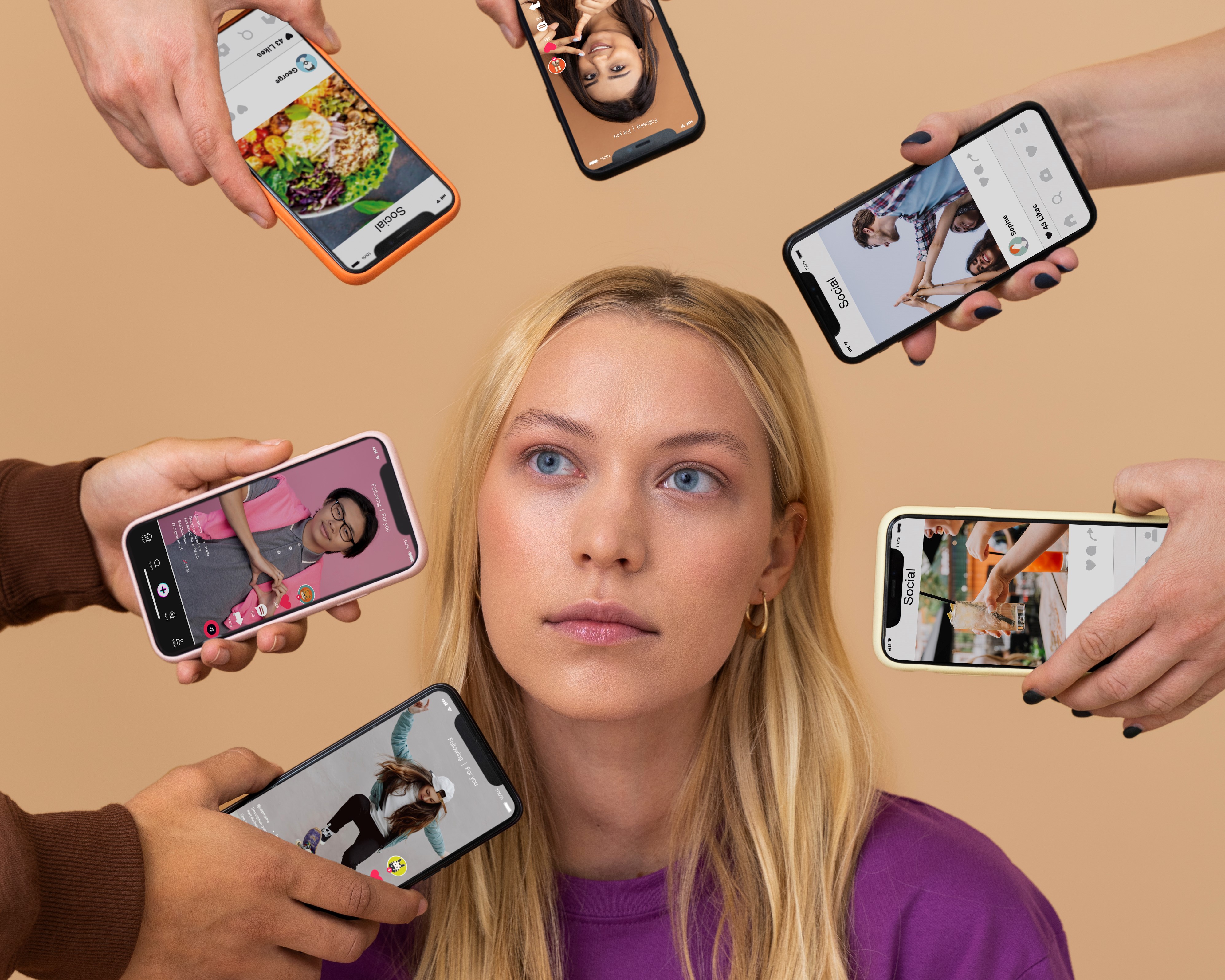
Downloads
Published
How to Cite
Issue
Section
License
Copyright (c) 2023 Revista de la Facultad de Medicina Humana

This work is licensed under a Creative Commons Attribution 4.0 International License.



